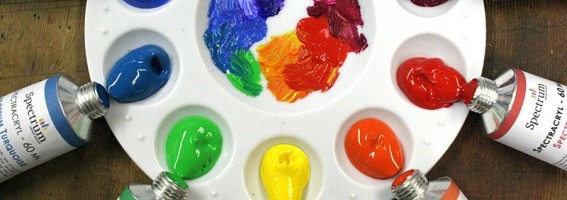One of my very favorite activities is my weekly acrylic painting class. Besides the fact that it is a perfect zone-out event that keeps me totally focused in the now, it is populated with other lovely like-minded artists. And because it is a class, it is also educational. We learn techniques to better express ourselves through our paint. The most fascinating aspect, however, is the tremendous differences in the way each painting turns out. Despite the fact the we each paint the very same picture, our finished products are remarkably different. Each unique painting is the product of the painter’s view of the world, and in particular, that one little snippet of it within the assigned picture. No one sets out to create a different painting, but our creations are influenced by our own unique visions of what we each perceive. These very differences are most fascinating to me and are clearly an expression of our individuality and how we interpret what we see. I realized that this exercise in painting is a metaphor of how we paint our lives. I began to think about how we color our lives, how we see and interpret what is around us, how we judge it to create an idea or belief and so on. So I began to ponder, how do we paint our lives? I was just wondering…………..
Acrylic is very forgiving, which is probably why I like it so much. If you make a mistake, you can just paint over it. We can paint with the same acrylic in our lives, I mused. We can learn forgiveness, we can learn to move on, we can learn new techniques from our errors and use them the next time. We don’t have to stay stuck in a bad picture. We can just paint over it!
As I mentioned, painting is the best thing I know to keep me in the now. There are many other things in life to keep us focused on the now, so that we can enjoy each moment as it occurs, rather than missing things because our focus is elsewhere. Do you paint your life with focus, or is your life filled with distraction, chaos, hurriedness? There are paintings that depict these unpleasant experiences as well. Which kind of painting do you create for yourself?
What is the mood of your life painting? Is it filled with color, beauty, pleasantry, serenity? Or does your life depict a painting filled with angst, despair, resentment, full of darkness, with cold murky corners, secrets, hidden meanings? Is your life painting orderly or is it filled with confusion, untidiness, chaos? Do you enjoy viewing your painting of your life, or do you shudder at the sight of it?
Does your painting have integrity, honesty, virtue? Or is it blackened by shame, disgrace, disrespect? Can you look at it with pride and feel satisfaction about how you behave and handle problems as they arise? If you don’t like it, how can you correct it? Perhaps you could add more color, remove the darkness, make it more honest, truer to the real picture.
What is the texture of your life painting? Is it bumpy, full of ups and downs? Or is it flat, too flat and boring, needing some added points of interest? Are there too many snags? Is it smooth sailing or is it a rocky sea for your “life” boat? Does it have too many rough edges?
What depth does your painting have? Is it demonstrated through your relationships? Are they loving, kind, supportive, nurturing? Or are they disengaged, unavailable, unloving? Sometimes if you look again they may seem different. Is there enough intimacy and fulfillment? Many paintings need to be studied, viewed with a keen eye. Sometimes we misinterpret and then have to paint over, or in the case of life, look again. Sometimes we miss love and support because we are not in a good place as we view it. If the fault is not in our vision, then it is time to connect to a better painting, drawing nurturing people into our lives.
What is the meaning of your life painting? Is this something you have thought about? If you have considered the meaning, then is it going in the direction you had intended? How can you change it so that the meaning becomes clearer and is experienced in your life as you would desire? What needs to be corrected and repainted?When I circle the room of my painting class, I get ideas from the other paintings I see. Sometimes these ideas help me to add or subtract something that makes my painting more interesting, more expressive, more unique. We are all stuck in our own vision of the world. It is very powerful to try to look again, see what you are viewing in another way. For your life painting, use some ideas from your admired friends to alter the parts of your life painting that you don’t like. Changing the picture is always possible. There are endless ways to depict the same thing, because it is different for every eye that views it. Readjust your sight! Paint over what you don’t like and try again. And don’t give up! You can achieve the same feeling of homeostasis that I have in my painting class when you make positive adjustments to your life painting!
After evaluating your life painting, are you happy with it? Are there changes that need to be made? Are you willing to start over and paint again in the areas that need touching up?
I was just wondering…………



